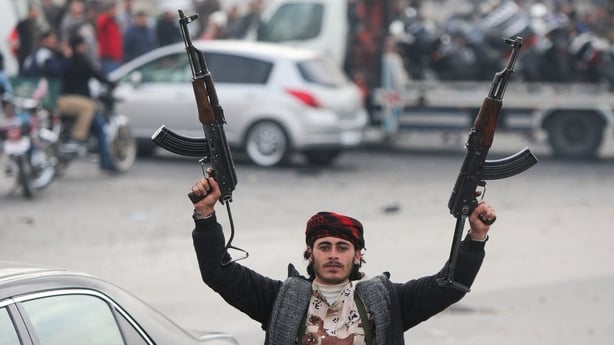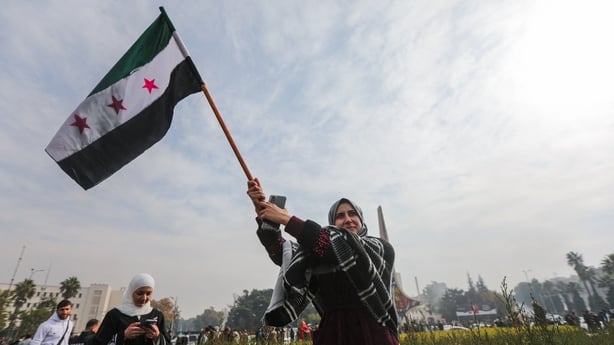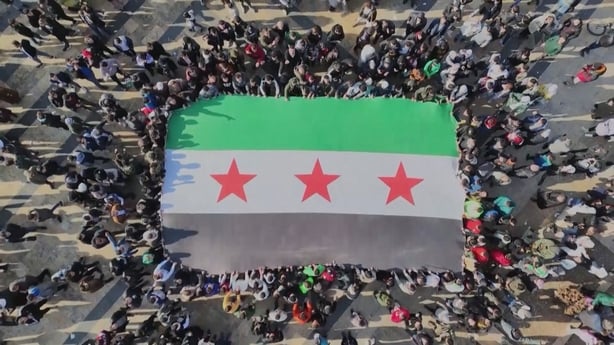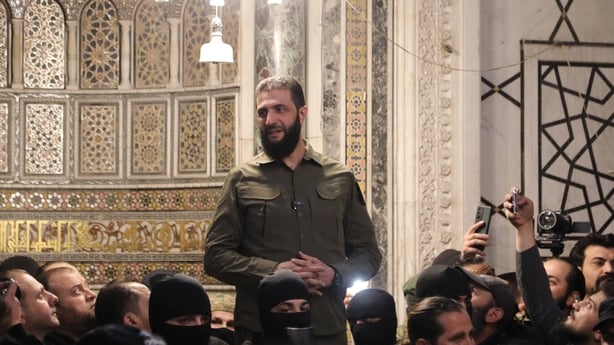The Syrian opposition has taken control of Damascus and ousted President Bashar al-Assad's regime, which has ruled the country for 50 years.
The lightning rebel offensive seems to have happened all at once - literally in just over ten days.
But those ten or 11 days are merely the capstone to a 13-year fight to take down the regime.
For the past four years, the conflict has alternately been described as "dormant" or "frozen".
So why has this happened now, all of a sudden?
The first thing to understand is that, while you'll often have heard talk about "the rebels" or "the Syrian opposition", one reason that the Syrian civil war has gone on for so long is that there were so many rebel groups.

There are jihadist, or extremist, factions; there are moderate groups; and then you have the Kurds. As you can imagine, there has even been disagreement within these factions.
While several opposition groups proclaimed to have altogether inclusive political aims - they said they wanted to bring everyone together - sectarianism has been a facet of the conflict from the very beginning, given the variety of religious sects in Syria.
In conflict theory, the more groups there are with a stake in a war - parties otherwise known as "veto players" - the longer a war roars on.
It's hard to take down a government if you can't agree on a strategy for doing so, and it's hard to agree on the terms of a ceasefire when you need to get more than two parties around a negotiating table.
Over the years, when Western governments wanted to intervene and provide support to the rebels in Syria, they usually failed to identify a cohesive, unified opposition front, simply because there wasn't one.
But what we see now is that the rebel groups have all seemingly united under the leadership of one group, Hayat Tahrir al-Sham.

Tahrir al-Sham is a former al-Qaeda affiliate group that has since broken with al-Qaeda.
It claims to be more moderate than it once was, and interested in leading a civilian government.
It also claims to have been preparing for its sweeping blitz through Syria for the better part of a year. It's thought that Turkey offered support to the coalition, even if Turkish officials have strongly rejected those claims.
The second, more clear cut, explanation as to why this has happened now is the weakness of the Assad regime.
Until recently, it had been able to rely on Russia, Iran and the Iran-backed Lebanese militant group, Hezbollah, for support.
At the height of the civil war, rebels had controlled huge swathes of Syria, in the north, south and east of the country. They also controlled areas around Damascus, putting immense pressure on the Assad regime.

But things turned around in 2015, when Russia conducted unrelenting airstrikes on the rebels, essentially bombing them into capitulation.
The Syrian government subsequently took back much of the territory.
Iran has long supported the regime by sending top military advisors to counsel Assad's forces, while Hezbollah militants were on the ground in Syria from as early as 2011.
For very obvious reasons, these allies of Assad are all distracted right now - Russia with its years-long war in Ukraine, while Iran and Hezbollah are depleted after more than 12 months of conflict with Israel.
The loss for Russia is hard to overstate. Its military bases in Syria represented their only real foothold in the region, even if much of the actual resources had been redirected to Ukraine.
And though Russia pledged "unconditional support" to the regime in recent days, and participated in airstrikes on areas seized by the rebels, it was not enough to stop their unremitting advances.
The question then, of course, is what happens next.

Attention will very quickly turn to the leader of Tahrir al-Sham, Abu Mohammad al-Jolani.
Can he can unite Syrians and the various factions in the country?
Syria's prime minister has said the government will extend its hand to the opposition and assist with the formation of a transitional government.
But Tahrir al-Sham has controlled the province of Idlib since 2017, home to millions of Syrians that fled government-controlled areas during the war.
They've ruled the city in a fairly conservative and hardline way, and have even faced protests there.
Mr Jolani, 42, has been accused of adopting an increasingly Islamist and dictatorial style in recent years, overseeing violent crackdowns on protesters.
That type of governance won't go down well in the rest of the country.
In an interview with The New York Times in recent days, Mr Jolani said his coalition's goal was to "liberate Syria from this oppressive regime".
And he has thus far managed to sustain an alliance with other rebel factions that hold far more moderate views.
However, the Tahrir al-Sham group is still regarded as a terrorist organisation by both the US and the United Nations.
So, while this is a moment of hope for many in Syria, it's also a moment of huge uncertainty.
The rebels may have overthrown a government, but it's really not clear whether they'll be able to lead one.






